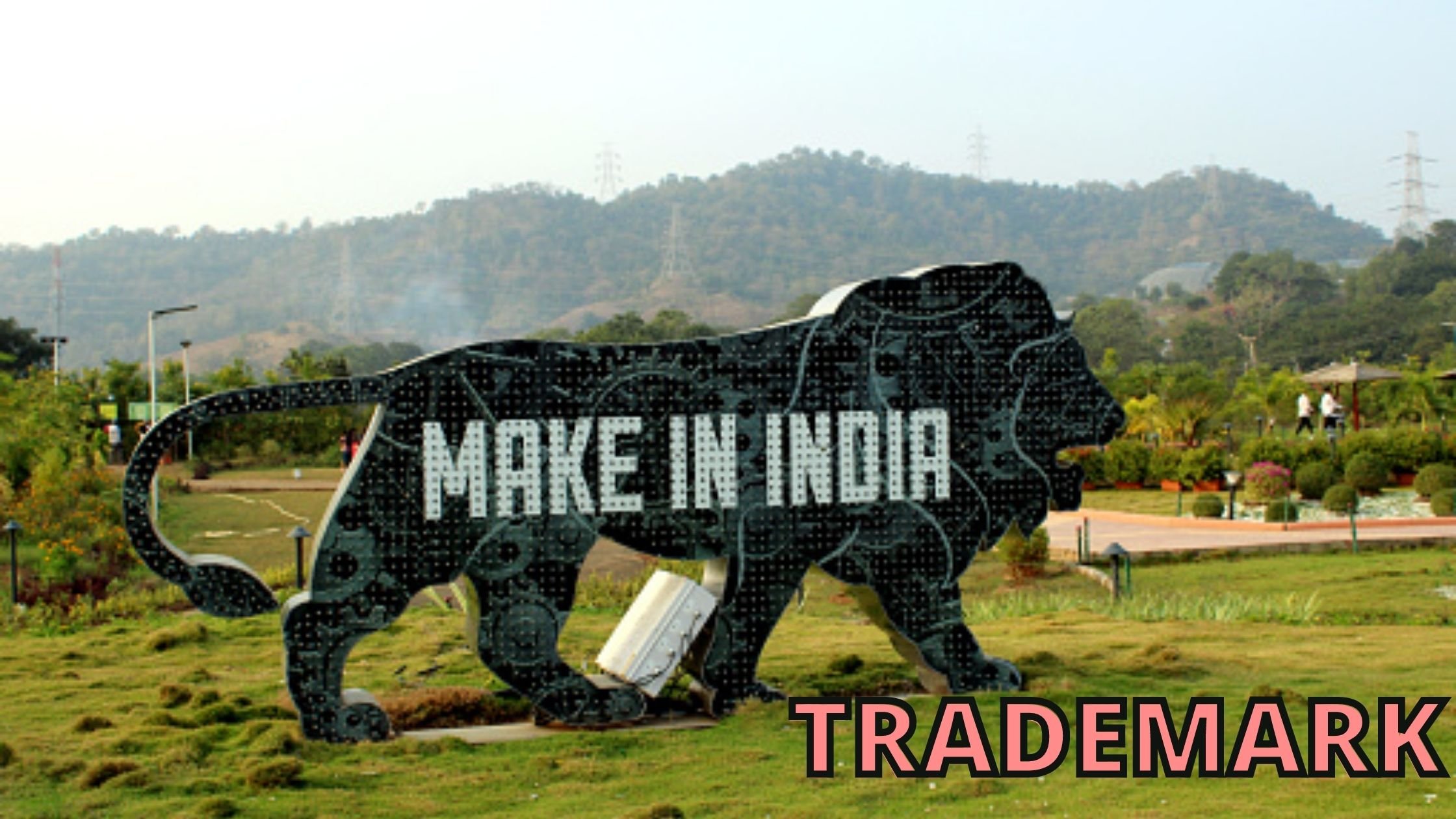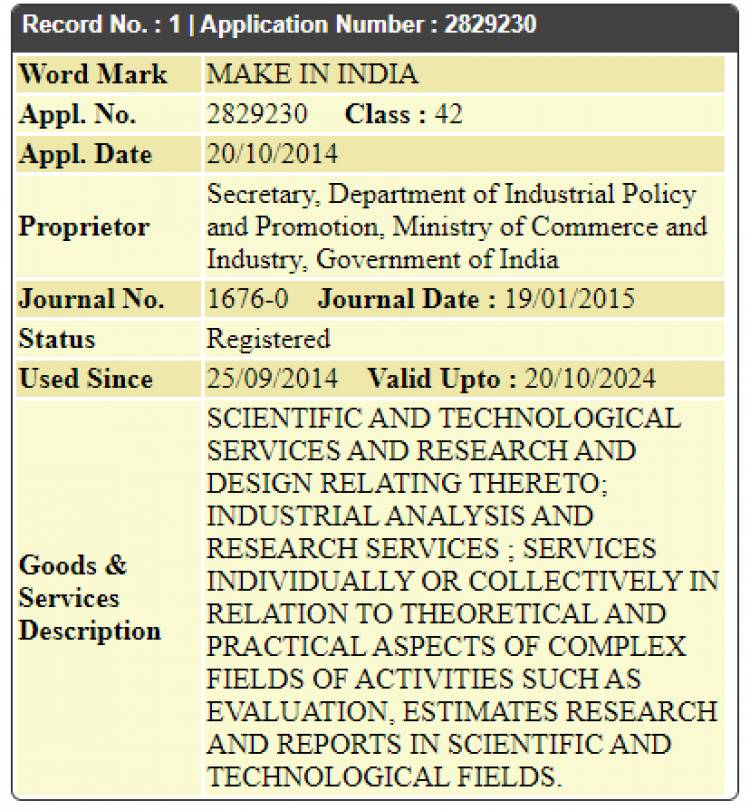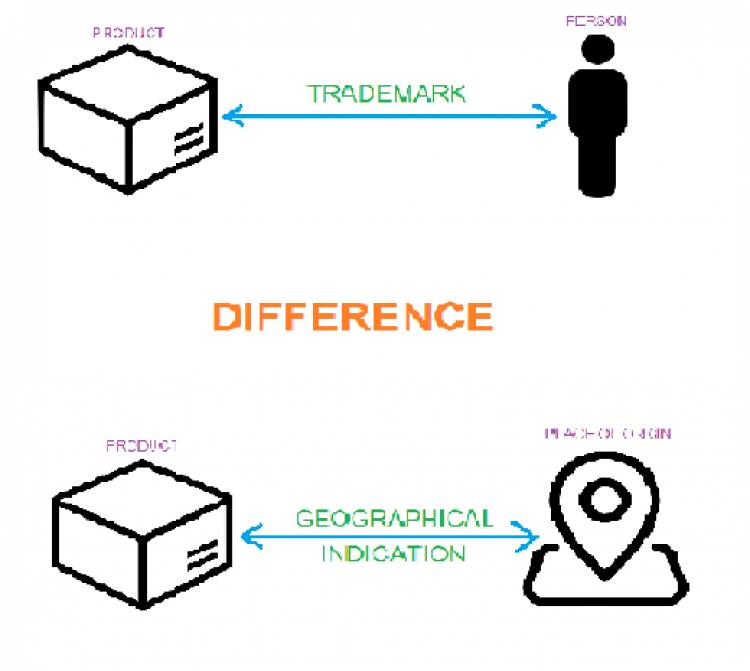All about ‘Make in India’ Trade Mark
The Make in India initiative is an ambitious program, launched by the Prime Minister in September 2014 as part of nation-building initiatives. The initiative was devised to transform India into a global design and manufacturing hub for foreign companies and investors.1 The flagship program intended to facilitate investments (primarily foreign investments), encourage innovations, enhance skill development, and protect IP Rights of the manufacturing industry. To achieve this, the Make in India program selected 25 economic sectors. The idea was to encourage more and more foreign companies to invest and manufacture their products in India.

Trademarks are marks capable of distinguishing a particular product or service of one person from that of another person. It indicates a connection between the goods or services and the person having the right to use the mark in course of trade. But this is not always the only objective of trademarks. Sometimes the trademark indicates that the products or services possess certain characteristics indicating authenticity or reliability of those products or services (ex. Certification trademarks). In such cases, the mark may not distinguish the product or service of one person from that of another person. There is another mark that is capable of distinguishing one product from another based on the geographical origin of that product. Such marks are known as Geographical Indication and they carry a given quality, reputation, process or preparation or another characteristic of such products which is essentially attributable to its geographical origin. The line differentiating between these three kinds of marks is very thin and apart from statutory distinctions provided under separate provisions and separate statutes, one might hardly recognize any differentiating factor. But recently, the introduction of the ‘Make in India’ logo has further diluted that thin line of separation and has become a subject of debate among legal scholars as well.
know more about trademark law and why is it important for your business, see the video below-
Brief Introduction about Make in India and the Logo
The Make in India initiative is an ambitious program, launched by the Prime Minister in September 2014 as part of nation-building initiatives. The initiative was devised to transform India into a global design and manufacturing hub for foreign companies and investors. The flagship program intended to facilitate investments (primarily foreign investments), encourage innovations, enhance skill development, and protect IP Rights of the manufacturing industry. To achieve this, the Make in India program selected 25 economic sectors. The idea was to encourage more and more foreign companies to invest and manufacture their products in India.
To achieve the intended purpose, the Make in India program was given a symbol in the form of a logo, which is a silhouette of a moving lion completely made of mechanical cogs to symbolize manufacturing strength and national pride.


The registration of the logo was sought in the application bearing the number 2829230 under multiple Classes i.e. 9, 16, 18, 25, 28, 35, 38, 41, and 42. The logo is registered as a device trademark. The registered proprietor of the trademark is Secretary, Department of Industrial Policy and Promotion, Ministry of Commerce and Industry, Government of India.
The Issue with the Trademark
The first and foremost issue comes, whether the logo at all would have been registered as a trademark. The issue is significant owing to the fact that, the logo symbolizes a policy, and policies are neither recognized as goods nor recognized as services. Policies are general principles that guide the government in its management of public affairs. Make in India is such a policy that facilitates others to provide goods or services to the consumers. Make in India itself is not the service or good. Thus one question naturally arises, how a symbol associated with the Government’s policy can be trademarked?
Certification Trademark or General Trademark
This is possibly the most debatable issue among the legal scholars with respect to the Make in India Logo. Let us take for the sake of argument that a mark associated with the government’s policy can be trademarked. Now according to the Trademarks Act, 1999, if a mark has not been used for a continuous period of five (5) years in course of trade, the registration of that mark shall be liable for cancellation. The only exception to this rule is a Certification trademark. Certification trademarks are not to be used by the registered proprietor in course of trade. However, he can authorize/certify others to use that certification trademark if they fulfill the regulatory criteria, set by the proprietor, in respect of which that certification trademark is registered. Keeping this in mind, when we look into the practical aspect of the Make in India logo, we can observe that the Government of India, being a registered proprietor, does not use the Make in India logo in course of trade with respect to any service or any goods. Rather, the Government of India authorizes others to use the Make in India logo in their products or services in course of trade. Furthermore, the BE-III Division, Department of Industrial Policy & Promotion [DIPP], Government of India set out guidelines for authorized use of the Make in India logo which is a prerequisite of a mark to be registered as Certification Trademark. The association of the Make in India logo gives a consumer an idea that the product is manufactured in India or the services such as resources or manpower is associated with India. It also indicates that such goods or services are somehow contributing to the Indian economy generating a sense of pride in the consumer.
The Resemblance of the Make in India logo with a GI Tag
As discussed in the preceding paragraph, the Make in India logo somehow gives an indication that the product manufacturing or the services availed is associated with our country India. General trademark does not indicate the geographical of the product; rather it is indicated by the Geographical Indication (GI). There is a basic difference between a trademark in general and a GI. A trademark indicates a connection between goods/services and the person registered as a proprietor. A GI, on the contrary, indicates a connection between goods and the place of origin or manufacturing.

Another difference is that GI does not subsist in relation to any services, unlike Trademark. However, a Certification trademark and a GI have some similarities. If a certification mark indicates certain characteristics of a product that is inherently linked with the place of origin of the product, such a mark can also be registered as a GI tag (ex. Darjeeling tea). Now, we have already discussed that the Make in India logo has all the requisite features to be considered as a certification trademark and it also indicates the place of origin that is India, with regard to any product. Therefore, will it be wrong if one argues that the Make in India logo should have been registered as a Geographical Indication rather than as a trademark in general? It will be difficult to deny such an argument as the facts available suggest otherwise.
Conclusion
The ambiguity associated with the Make in India logo has already gained momentum in the legal fraternity. The uncanny resemblance and lack of clarity by the Government of India while registering the logo have once again stimulated the debate about the need for distinction between these three kinds of marks. Some advocated the failure of this distinction while others argued otherwise. But as of today, the Make in India logo is registered as a Trademark in general, having the characteristics of a Certification Trademark and indicating India as a Geographical Indication.
BY -
DEBKRIPA BURMAN












